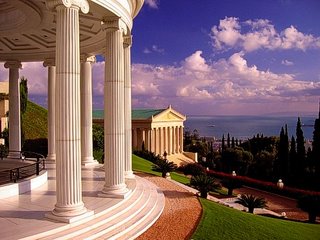
Who are the Prophets?
1The Bahá'í teachings hold that the motive force in all human development is the coming of the Manifestations or Prophets of God. There can be little disagreement that human history is strongly influenced by the Founders of the world's great religions. The powerful impact on civilization of Jesus Christ, Buddha, Moses, or Muhammad is seen not only in the cultural forms and value systems which arise from Their works and teachings, but is also reflected in the effects that the example of Their lives has on humankind. Even those who have not been believers or followers have nevertheless acknowledged the profound influence of these figures on individuals and on humanity's collective life.The realization of the extraordinary impact on human history of the Founders of the major religions naturally leads to the philosphical question of their exact nature. This is one of the most controversial of all questions in the philosophy of religion, and many different answers have been given. On the one hand, the religious Founders have been viewed as human philosophers or great thinkers who have perhaps gone further or studied more profoundly than other philosophers of their age. On the other hand, They have been declared to be God or the incarnation of God. There have also been a multitude of theories that fall somewhere between these two extremes.
2It is thus not surprising that the Bahá'í writings deal extensively with this subject, which lies so close to the heart of religion. One of Bahá'u'lláh's major works, the Kitab-i-Íqan, (Book of Certitude), sets out in some detail the Bahá'í concept of the nature of the Manifestations of God.According to
Bahá'u'lláh , all of the Manifestations of God have the same metaphysical nature and the same spiritual stature. There is absolute equality among Them. No one of Them is superior to another. Speaking of the Manifestations, He wrote:These sanctified Mirrors, these Day Springs of ancient glory, are, one and all, the Exponents on earth of Him Who is the central Orb of the universe, its Essence and ultimate Purpose. From Him proceed their knowledge and power; from Him is derived their sovereignty.... By the revelation of these Gems of Divine virtue all the names and attributes of God, such as knowledge and power, sovereignty and dominion, mercy and wisdom, glory, bounty, and grace, are made manifest.These attributes of God are not, and have never been, vouchsafed specially unto certain Prophets, and withheld from others.... That a certain attribute of God hath not been outwardly manifested by these Essences of Detachment doth in no wise imply that they who are the Day Springs of God's attributes and the Treasuries of His holy names did not actually possess it.
3Bahá'u'lláh explained that the differences which exist between the teachings of the various Manifestations of God are not due to any differences in stature or level of importance, but only to the varying needs and capacities of the civilizations to which They appeared:These ... mighty systems, have proceeded from one Source, and are the rays of one Light. That they differ one from another is to be attributed to the varying requirements of the ages in which they were promulgated.
4In the strongest terms, he warned people not to take the variations in the teachings and personalities of the Manifestations to imply a difference in their statures:Beware, O believers in the Unity of God, lest ye be tempted to make any distinction between any of the Manifestations of His Cause, or to discriminate against the signs that have accompanied and proclaimed their Revelation. This indeed is the true meaning of Divine unity.... Be ye assured, moreover, that the works and acts of each and every one of these Manifestations of God ... are all ordained by God, and are a reflection of His will and Purpose. Whoso maketh the slightest possible difference between their persons, their words, their messages, their acts and manners, hath indeed disbelieved in God, hath repudiated His signs and betrayed the Cause of His Messengers.
5However, the Bahá'í doctrine of the oneness of the Manifestations does not mean that the same individual soul is born again in different physical bodies. Moses, Jesus Christ, Muhammad, and Bahá'u'lláh were all different personalities, separate individual realities. Their oneness lies in the fact that Each manifested and revealed the qualities and attributes of God to the same degree: the spirit of God which dwelled within any one of Them was identical to that which dwelled in the others.Bahá'u'lláh offered an analogy to explain the relationship between the different Manifestations, and the relationship between each Manifestation and God. In this analogy, God is likened to the sun because He is the unique source of life in the universe in the same way that the physical sun is the unique source of all physical life on earth. The spirit and attributes of God are the rays of this sun and the individual Manifestation is like a perfect mirror. If there are several mirrors all turned toward the same sun, that unique sun is reflected in each mirror. Yet the individual mirrors are different, each having been made in its own form and distinct from any other.In the same way, each Manifestation is a distinct individual being, but the spirit and attributes of God reflected in Each are the same. The analogy of the sun and the mirrors enables us to understand the Bahá'í interpretation of the traditional notion of the "return" or "reappearance" of former Manifestations. The theme of return is found in the sacred scriptures all the major religions, often couched in highly symbolic language. Western readers will be most familiar with the Christian expectation of the return or "Second Coming" of Christ, based on certain passages of the Old and New Testaments of the Bible. Bahá'u'lláh explains that the return alluded to in former scriptures is the return of the attributes and spirit of God in the mirror of another Manifestation, not the return of the same human personality: "It is clear and evident ... that all the Prophets are the Temples of the Cause of God, Who have appeared clothed in divers attire. If thou wilt observe with discriminating eyes, thou wilt behold Them all abiding in the same tabernacle, soaring in the same heaven, seated upon the same throne, uttering the same speech, and proclaiming the same Faith.... Wherefore, should one of these Manifestations of Holiness proclaim saying: 'I am the return of all the Prophets,' He, verily, speaketh the truth. In like manner, in every subsequent Revelation, the return of the former Revelation is a fact, the truth of which is firmly established...."
6In this way, Bahá'ís consider that the Manifestation Bahá'u'lláh fulfills the promise of the return of Christ even though Bahá'u'lláh and Jesus have distinct individual souls and therefore distinct human personalities.The Manifestations represent a level of existence intermediate between God and humanity. Just as humans are superior to the animal because they possess capacities that the animal does not (i.e., the rational and intuitive capacities of the nonmaterial soul), so the Manifestations possess capacities which ordinary humans lack. It is not a difference in degree, but rather a difference in kind which distinguishes Them from other. The Manifestations are not simply great human thinkers, or philosophers, with a greater understanding or knowledge than others. They are, by their very nature, superior to those who do not possess a similar capacity.The Bahá'í teachings emphasize that human beings have a dual nature: the physical body, which is composed of elements and which functions according to the same principles as an animal's body; and the nonmaterial rational and immortal human soul. The Manifestations, Bahá'u'lláh taught, also have these two natures, but in addition They possess a third nature unique to Their station: the capacity to receive divine revelation and to transmit it infallibly to humanity:Know that the Holy manifestations, though they have the degrees of endless perfections, yet, speaking generally, have only three stations. The first station is the physical; the second station is the human, which is that of the rational soul; the third is that of the divine appearance and the heavenly splendor.The physical station is phenomenal; it is composed of elements, and necessarily everything that is composed is subject to decomposition.... The second is the station of the rational soul, which is the human reality. This also is phenomenal, and the Holy Manifestations share it with all mankind.... The spirit of man has a beginning, but it has no end; it continues eternally....The third station is that of the divine appearance and heavenly splendor: it is the Word of God, the Eternal Bounty, the Holy Spirit. It has neither beginning nor end....the reality of prophethood, which is the Word of God and the perfect state of manifestation, did not have any beginning and will not have any end; its rising is different from all others and is like that of the sun.
7`Abdu'l-Bahá explained that even the individual soul of the Manifestation is different from that of ordinary people:But the individual reality of the Manifestations of God is a holy reality, and for that reason, it is sanctified, and in that which concerns its nature and quality, is distinguished from all other things. It is like the sun, which by its essential nature produces light and cannot be compared to the moon.... So other human realities are those souls who, like the moon, take light from the sun; but that holy reality is luminous in Himself.
8The Manifestation then, is not simply an ordinary person whom God chooses at some point in His natural lifetime to be His messenger. Rather, the Manifestation is a special Being, having a unique relationship to God and sent by Him from the spiritual world as an instrument of divine revelation. Even though the individual soul of the Manifestation had a phenomenal beginning, it nevertheless existed in the spiritual world prior to physical birth in this life. The immortal souls of ordinary men, on the other hand, have no such preexistence, but come into existence at the moment of human conception. Of the preexistence of the souls of the Manifestations,
Shoghi Effendi said:The Prophets, unlike us, are pre-existent. The soul of Christ existed in the spiritual world before His birth in this world. We cannot imagine what that world is like, so words are inadequate to picture His state of being.
9The Manifestation has the awareness of His reality and identity even from childhood, though He may not begin His mission of openly teaching and instructing others until later in life. Because They are the direct recipients of revelation from God, the Manifestations possess absolute knowledge of the realities of life. This innate, divinely revealed knowledge alone enables Them to formulate teachings and laws that correspond to human needs and conditions at a given time in history:Since the Sanctified Realities, the supreme Manifestations of God, surround the essence and qualities of the creatures, transcend and contain existing realities and understand all things, therefore Their knowledge is divine knowledge, and not acquired--that is to say, it is a holy bounty, it is a divine revelation.... the supreme Manifestations of God are aware of the reality of the mysteries of beings. Therefore They establish laws which are suitable and adapted to the state of the world of man, for religion is the essential connection which proceeds from the realities of things.... [T]he supreme Manifestations of God ... understand this essential connection, and by this knowledge establish the Law of God.
10The preceding passage makes clear that God's laws are inherent in the structure of reality: the Manifestation understands these laws, but did not create them. Humans can therefore discover some of these laws on their own, but other statements in the Bahá'í writings indicate that humanity would destroy itself if left unaided (i.e., without Divine Revelation) to discover all of them.No one can "become" a Manifestation of God. Each individual soul is capable of being touched by the spirit of God and may therefore make spiritual progress. But the Manifestation remains on an ideal level beyond that which even the most perfect person is capable of attaining.Extending the mirror analogy, the souls of ordinary people may also be likened to mirrors--but, unlike the Manifestations, they are imperfect. In other words, each human being can reflect something of God's attributes, but only in an imperfect and limited way. For ordinary human beings, spiritual progress implies perfecting, cleansing, and polishing the mirror of the soul so that it may reflect ever more clearly the attributes of God. In several passages, Bahá'u'lláh explicitly used this example of "cleansing the mirror" as an analogy for spiritual progress. The analogy emphasizes the belief that humans are created imperfect, but with an endless potential for perfection; whereas the Manifestation is already in a perfected state of being.Bahá'u'lláh and `Abdu'l-Bahá taught that there are no levels of being other than the three discussed above: human beings, the Manifestations, and God. There is no hierarchy of demons, angels, and archangels. Insofar as these terms have any significant meaning, they are seen as symbolic of varying stages of human development, imperfection being demonic and spirituality being angelic. The Manifestations are already in a state of perfection, while human beings are potentially perfect in that each soul has the potential to reflect the attributes of its Creator. The ultimate state of perfection for a person, as explained below by `Abdu'l-Bahá, is one of absolute servitude to God:Know that the conditions of existence are limited to the conditions of servitude, of prophethood, and of Deity, but the divine and the contingent perfections are unlimited.... As the divine bounties are endless, so human perfections are endless. If it were possible to reach a limit of perfection, then one of the realities of the beings might reach the condition of being independent of God, and the contingent might attain to the condition of the absolute. But for every being there is a point which it cannot overpass ... he who is in the condition of servitude, however far he may progress in gaining limitless perfections, will never reach the condition of Deity.... Peter cannot become Christ. All that he can do is, in the condition of servitude, to attain endless perfections....
11However, because a human being is capable of entering into communion with God and thereby becoming aware of the spirit of God, he or she is also capable of "inspiration." The Bahá'í writings distinguish between inspiration and revelation. Revelation is that infallible and direct perception of God's creative Word that is accessible only to the Manifestations, Who transmit it to humankind. Inspiration is the indirect and relative perception of spiritual truth which is available to every human soul. It arises out of the context of the spiritual life of a culture influenced by a Manifestation of God. Any human is capable of being inspired by the spirit of God. But the experience of inspiration is available to us because the spirit of God is mediated to us through the Manifestations. In short: inspiration depends upon revelation.Bahá'u'lláh explained that the Divine Will of God does sometimes choose ordinary people as "prophets" and inspires them to play certain roles in human affairs. Examples include the Hebrew prophets Isaiah and Jeremiah. Still others have been inspired as "seers" or "saints." Not even the prophets, however, are anywhere close to the station of the Manifestations, Who provide humankind with God's infallible revelation. The prophets are still ordinary men and women whose powers of inspiration have been developed and used by God. They are referred to as "minor prophets" or "dependent prophets" in the Bahá'í writings. When this terminology is used, the Manifestations are called "universal" or "independent" Prophets:Universally, the Prophets are of two kinds. One are the independent Prophets who are followed; the other kind are not independent, and are themselves followers.The independent Prophets are the lawgivers and the founders of a new cycle.... Without an intermediary They receive bounty from the Reality of the Divinity, and Their illumination is an essential illumination. They are like the sun which is luminous in itself.... The other Prophets are followers and promoters, for they are branches and not independent; they receive the Bounty of the independent Prophets, and they profit by the light of the Guidance of the universal Prophets. They are like the moon which is not luminous and radiant in itself, but receives its light from the sun.
12Consequently, Bahá'ís consider philosophers, reformers, saints, mystics, and founders of humanitarian movements as ordinary people. In many cases they may have been inspired by God. Revelation, however, is the endowment of the Manifestations alone, and it is the ultimate generating force of all human progress.
Adapted from William S. Hatcher and J. Douglas Martin, The Bahá'í Faith: The Emerging Global Religion (San Francisco: Harper and Row, 1985), pp. 115-123.An objective discussion of this fundamental question of the nature of what Bahá'ís refer to as the Manifestation of God is made more difficult by traditional loyalties. Orthodox followers of each Manifestation have tended to claim some kind of uniqueness or superiority for the Founder of their faith. For example, many Christians view Jesus Christ as God incarnate, consider Moses to be inferior Him in some way, and regard Muhammad as an imposter. A majority of orthodox Jews see Moses as the human vehicle through which the Law of God was transmitted to humanity and consider Jesus Christ to be a false prophet. Muslims consider both Moses and Jesus Christ to be valid prophets, but the majority reject the Buddha and the Founders of other major faiths. For them, Muhammad was the last prophet whom God will send to man, and revelation of the Divine Will ended with the Qur'an.Bahá'u'lláh, Gleanings from the Writings of Bahá'u'lláh, 2d rev. ed. (Wilmette: Bahá'í Publishing Trust, 1976), pp. 47-48.Bahá'u'lláh, Gleanings, pp. 287-88.Bahá'u'lláh, Gleanings, pp.59-60.Bahá'u'lláh, Gleanings, p. 52.`Abdu'l-Bahá, Some Answered Questions, 3d ed. (Wilmette: Bahá'í Publishing Trust, 1981), pp. 151-52.`Abdu'l-Bahá, Some Answered Questions, p. 154.Shoghi Effendi, High Endeavours, Messages to Alaska (National Spiritual Assembly of the Bahá'ís of Alaska, 1976), p. 71.`Abdu'l-Bahá, Some Answered Questions, pp. 157-59.`Abdu'l-Bahá, Some Answered Questions, pp. 230-31.`Abdu'l-Bahá, Some Answered Questions, p.



